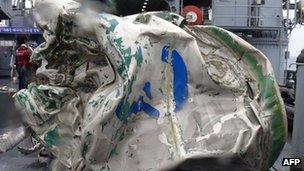North Korea rocket 'has 10,000km range'
- Published

North Korea's recent rocket launch shows it has the ability to fire a rocket more than 10,000km (6,200 miles), South Korean officials say.
The estimate, which would potentially put the Western US in range, was based on an analysis of rocket debris.
However, there was no confirmation that the North had the re-entry technology needed to deliver a missile.
Experts believe North Korea is also years away from gaining the ability to mount a nuclear bomb on a missile.
North Korea launched the Unha-3 rocket on 12 December, in defiance of sanctions and international warnings.
It was the first time the North had made successful use of a three-stage rocket to put a satellite into orbit, and observers said it appeared to mark a step towards fielding an intercontinental range ballistic missile.
"As a result of analysing the material of Unha-3 (North Korea's rocket), we judged North Korea had secured a range of more than 10,000km in case the warhead is 500-600kg," a South Korean defence ministry official told journalists.
'Crude'
The official said the type of oxidiser container that was found from the first stage of the rocket launch would rarely be used by countries with advanced space technology.
"Welding was crude, done manually," the official said.
South Korea would not be able to tell whether the North had the technology to achieve re-entry until debris from the second and third stages of the rocket launch was analysed, the defence ministry said.
"As the additional pieces are salvaged, we will be able to look deeper into the function and structure of North Korea's long-range rocket," an official was quoted as saying by South Korea's Yonhap news agency.
Experts believe many more rocket and nuclear tests will be necessary before North Korea can boast a credible delivery system.
North Korea insists the rocket it launched is part of a civilian space programme.
But BBC Asia analyst Charles Scanlon says the North clearly wants its threat to be taken seriously, believing this to be the best way of deterring potential aggression, boosting the prestige of its leader, and being granted equal diplomatic status.
The North has been happy declare itself a nuclear power, he adds, and it frequently threatens neighbouring countries, and the US, with massive retaliation for perceived slights.
The UN Security Council condemned this month's rocket launch.
It said it violated two UN resolutions banning Pyongyang from missile tests, passed after it conducted nuclear tests in 2006 and 2009.
The rocket was celebrated extravagantly in North Korea, with a mass rally held in the capital, Pyongyang.
The North's leader, Kim Jong-un, called for the development and launching of "a variety of more working satellites" and "carrier rockets of bigger capacity" at a banquet to mark the launch on Friday, North Korean state media reported.